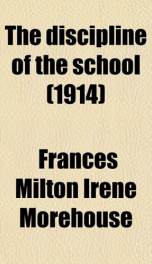the discipline of the school

Purchase of this book includes free trial access to www.million-books.com where you can read more than a million books for free. This is an OCR edition with typos. Excerpt from book: CHAPTER II THE MODES OF SCHOOL GOVERNMENT All the training which society gives to individuals, which helps them better to control their powers, may be called disciplinary. This disciplinary control springs y from a variety of relationships and principles, which may be divided for the sake of convenience into five general classes, giving rise to five types or modes of government. While each mode is distinct in its origins, nature, and results, few concrete instances of school Five fundamental government can be classed exactly with any one mode, modes owing to the complex nature of schoolroom life and aims. In actual practice the modes overlap, merging imperceptibly or passing sharply one into another. They represent nodal points in methods of school management, however; they are types of the means used to secure and keep good order and a good spirit in a schoolroom. They predominate at various periods in the development of any one child; they are variously emphasized by different teachers, communities, and ages; they supplement and strengthen one another in a thousand ways. Through all their elaborate inter-relations, however, the fundamental differences in these five modes remain unchanged. In the follow- ing discussion they are treated approximately in the order of their historical development, and in the reverse order of their probable worth in bringing about ideal school conditions. The natural origin of school authority I. The Mode Of Absolute Authority Pedagogy in its simplest form is the oldest science practiced by man. The man who mastered the first rude art taught it to his children and his neighbors, and because he knew more than they, found himself in a position of authority among them. Greatest of all men was Prometheus; and every unknown fire- brin...
Info about the book
Author:
Series:
Unknown
ISBN:
1140806343
Rating:
4/5 (2)Your rating:
0/5
Languge:
English
Users who have this book
Users who want this book
What readers are saying
What do you think? Write your own comment on this book!
write a commentif you like the discipline of the school try:
Other books by this author
Do you want to read a book that interests you? It’s EASY!
Create an account and send a request for reading to other users on the Webpage of the book!



